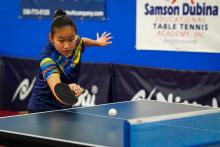It is very difficult for the players to imagine a motor action that is only described with words. Nothing can replace the image. It is therefore strongly recommended to put the proposed exercises into an image either by letting the players or the coach demonstrate it or by showing a video of a high level player.
Questioning is an important part of the pedagogy employed because it allows to rephrase what has been said and to get a better idea of the player’s understanding of the instructions they are meant to follow.
The following extract from Jame Witmore’s “Coaching Guide” shows the importance of these questions in the pedagogical approach… Forcing people to do something or asking closed questions prevents people from having to think. Asking open questions forces them to think for themselves!!!!!!!
These are the questions that result in disposition and responsibility. It would be simple if every question had that effect, but it doesn’t. Therefore, we have to examine the pertinence of several types of possible questions. In order to do that, I will use a simple sports analogy… Everybody knows that the most commonly heard advice on tennis courts is to “watch the ball.” In many sports, it is in fact extremely important to watch the ball, but is this simple advice enough to make everybody do it?????? Obviously not, or we would be much better at tennis than we are.
A golf player hits the ball harder and straighter if he is relaxed, but if you gave him the advice “relax”, would he in fact relax? No, and most likely it would even have the opposite effect. If telling somebody what he needs to do does not have the desired effect, what does????
Let’s try a question. “Are you watching the ball? How can you answer that question? Maybe in a defensive way, maybe even a little bit like in school when the teacher asked us whether we were listening carefully. “Why are you not watching the ball?” Our answer to that question would risk being even more defensive – or maybe more analytical. “But I am”, “I don’t know”, “I am concentrating on my grip of the racket” or, in an even more likely way “because you are breaking my concentration and making me nervous!”
All of these questions are not very effective, but look at the follow: “In which direction is the ball turning when it passes the net?” “At what height has it passed the net?” These are completely different question. They have four important effects in comparison with the other questions or instructions: this type of question forces the player to watch the ball. If he doesn’t, then he cannot answer the questions. The player has to concentrate hard on the ball to be able to correctly answer these questions which will lead to better quality input.
The answers you are looking for are descriptive. They are not judgmental. Therefore, there is no risk of the player criticizing himself or losing confidence in himself. These questions will provide the coach with feedback and will verify the pertinence of the player’s answers, and therefore his concentration. What we need to ask ourselves is why so many coaches continue shouting orders such as “Watch the ball!” I will give you 2 reasons: On the one hand, they have never really looked to see whether this is effective or not because we have always done it that way. On the other hand, they are more concerned about what they are saying than about the effect this might have on their students. What is the purpose of these questions? Most of the time, when you ask a question, the purpose is to receive information. I can (for example) ask for information that I am missing to resolve a problem. But in pedagogical intervention, answers are only of secondary importance. The information asked for does not have to be supplied in an exhaustive manner because its purpose is not for the coach personally to use it. The only thing which is important for him to verify is that the students have the necessary information.
_______________________________________________________________________________________________________________________________________________
We would love to have YOU join us at one of our weekly events or one of our major upcoming tournaments! Click on the links below or send me an e-mail and I would love to get you signed up!
Major Tournaments!
Nittaku Ohio Open Entry Form
Nittaku Ohio Open Player Listing
$6000 Presper Financial Architects Entry From
$6000 Presper Financial Architectst Player Listing
Weekly Events
Paddle Palace Ohio League
Kids Classes
Adults Classes
Advanced Classes
Homeschool Classes
Private Lessons
Open Play
See you soon!
Samson Dubina
NOW OPEN
Hours of Operation:
- Mondays 4pm-10pm
- Tuesdays 4pm-10pm
- Wednesdays noon-6pm
- Thursdays 4pm-10pm
- Fridays 4pm-10pm
- Saturdays noon-6pm
Samson Dubina Table Tennis Academy
Phone: 330-949-9230
E-Mail: tt@SamsonDubina.com
Website: www.SamsonDubina.com
Address: 2262 South Arlington Rd Akron, Ohio 44319




